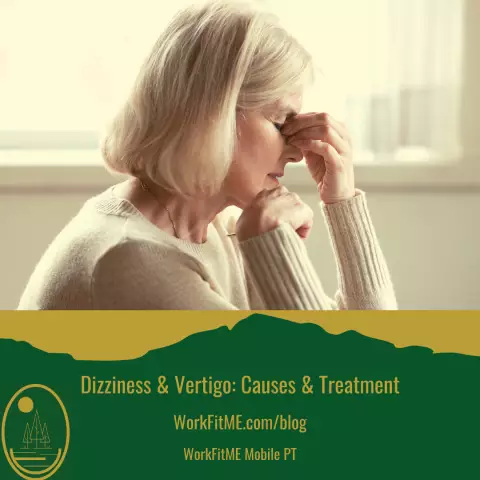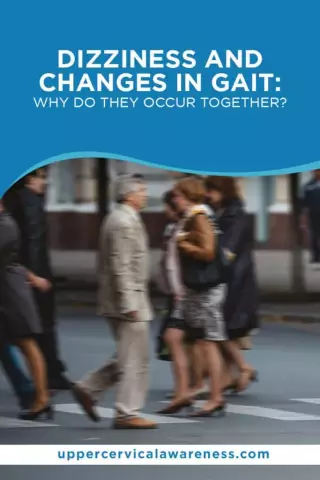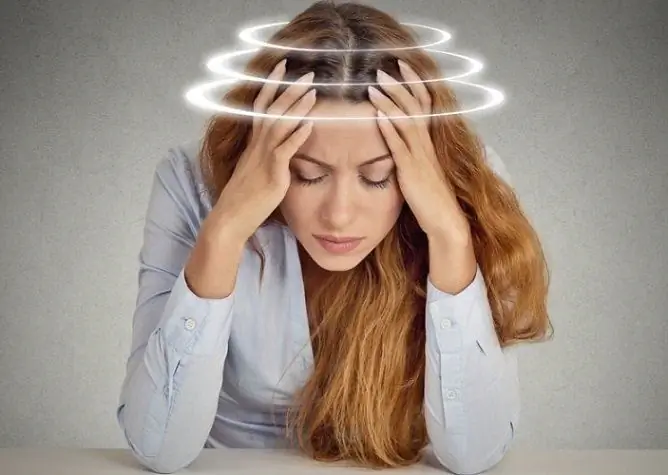- Author Rachel Wainwright wainwright@abchealthonline.com.
- Public 2023-12-15 07:39.
- Last modified 2025-11-02 20:14.
Dizziness: 6 main reasons
Everyone experiences dizziness from time to time. In most cases, it has purely physiological reasons, for example, if there was a sharp rush of adrenaline into the blood (with fear, excitement or sudden joy). For some, dizziness is associated with motion sickness in transport, and in such a situation, the brain is the direct culprit for discomfort: it tries to quickly interpret conflicting information coming to it from the organs of vision and balance. Dizziness may begin when climbing to a great height or when the body is tilted abruptly. With improper nutrition, discomfort occurs due to insufficient concentration of glucose in the blood.

Source: depositphotos.com
All described cases are considered variants of the norm. But there is also dizziness, which torments patients constantly. This is not an independent disease, but a symptom of one of the pathological conditions that require medical intervention.
Pathologies of the vestibular apparatus and hearing organs
The work of the vestibular apparatus may be disrupted due to the transferred otitis media. In this case, sudden attacks of dizziness occur, as well as the illusion of falling nearby objects, tilting walls or spontaneous movement of the body in space. The attacks are accompanied by cold sweats and nausea, usually preceded by a sharp pain in the ear.
If the dizziness is increased by sneezing and coughing and there is a simultaneous severe unilateral hearing loss, the patient may have a perilymphatic fistula (damage to the membrane separating the inner and middle ear).
Malfunctions in the vestibular apparatus are one of the signs of Meniere's disease. With this ailment, the volume increases or the electrolyte composition of the fluid washing the inner ear cavity is disturbed. Pathology is characterized by the following symptoms:
- bouts of dizziness that can last for hours;
- whistling and noise in the ears;
- hearing loss, often selective. For example, a person may almost not perceive loud sounds, but it is fine to hear when they speak in a whisper.
The so-called benign positional vertigo occurs when the receptors of the vestibular apparatus are partially destroyed. The main symptom of the disease is short-term attacks of dizziness (lasting up to several minutes) with a certain turn of the head.
Cerebral circulation disorders
Acute violation of cerebral circulation (stroke) often gives rise to sudden dizziness. If this kind of discomfort is combined with weakness, clouding or loss of consciousness, sound or visual effects (tinnitus, dots in front of the eyes), as well as impaired coordination of movements and speech, this is an extremely dangerous condition in which the patient needs urgent hospitalization.
Patients suffering from migraines note that dizziness, accompanied by a painful reaction to sound and light, is often a precursor to another attack.
Constant, gradually increasing dizziness in combination with a smooth one-sided hearing loss is an alarming bell: this is how a growing brain tumor can manifest itself.
Poisoning
When the body is intoxicated, dizziness and headache occur simultaneously. This can occur with a severe infectious disease, the consumption of alcohol or poor quality food, chemical poisoning, or inhalation of combustion products. The accompanying symptoms differ depending on the reasons. Shortness of breath, nausea, vomiting, diarrhea, abdominal pain, fever, etc. may occur.
Neuroses and depression
Vertigo is sometimes psychogenic in nature. In this case, it torments the person for a very long time and is accompanied by severe psychological discomfort. The patient complains of anxiety, insomnia, fear of a sudden fall and bouts of lightheadedness.

Source: depositphotos.com
Spine diseases
Osteochondrosis of the upper spine often causes dizziness associated with movement. Unpleasant sensations regularly occur when turning the body, bending and extending the neck. At rest, the discomfort usually goes away.
Taking medication
Some drugs can cause dizziness. These include tranquilizers, antibiotics, antihistamines, hypnotics, and anticonvulsants. The degree of susceptibility to such side effects varies from person to person. If the patient is seriously uncomfortable with a certain medication, it is usually replaced.
In case of sudden dizziness, lie down, close your eyes and try to calm down. You can not walk and make sudden movements. If the discomfort does not disappear within 10-15 minutes, you must call a doctor. And if you periodically suffer from dizziness, be sure to contact a medical institution for examination. If an illness is the cause, it is best to diagnose it early to increase the likelihood of a full recovery.
YouTube video related to the article:

Maria Kulkes Medical journalist About the author
Education: First Moscow State Medical University named after I. M. Sechenov, specialty "General Medicine".
Found a mistake in the text? Select it and press Ctrl + Enter.






